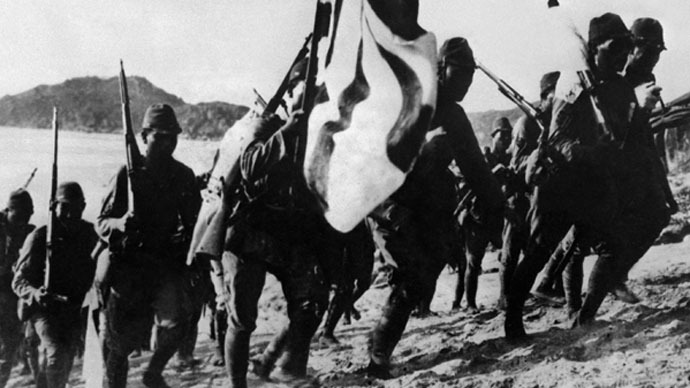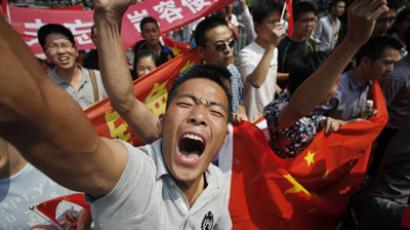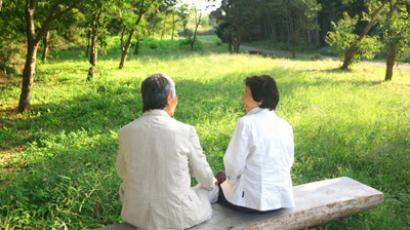Japan politician condones WWII ‘comfort women’ sex slavery

The proximity of the battlefield gave rise to the ‘comfort women’ system on Japanese-occupied territories in the 1930s, according a Japanese politician. Hundreds of thousands of Chinese and Korean women were forced into sex slavery at the time.
All is fair in love and war, espoused Toru Hashimoto, the mayor of Osaka and co-founder of nationalistic opposition party Nippon Ishin no Kai (Japan Restoration Party).
Those sex slaves were euphemistically called ‘comfort women’ and came from several countries, mostly China and Korea, but also from Indonesia, the Philippines and Taiwan. It is believed that no less than 200,000 women passed through this system.
“In the circumstances in which bullets are flying like rain
and wind, the soldiers are running around at the risk of losing
their lives. If you want them to have a rest in such a situation, a
comfort women system is necessary. Anyone can understand that,”
Hashimoto told reporters at the Osaka City Government building.
Brothels were needed “to maintain discipline in the military -
it must have been necessary at that time,” he
specified.

Hashimoto stressed that he is familiar with the history of the period and insisted that sex slavery was common not only in the Japanese army, an obvious reference to alleged ‘Joy Divisions’ in Nazi concentration camps in Europe during World War II.
An unidentified government official told South Korean Yonhap news agency that Seoul is disappointed that a senior Japanese official “made comments supportive of crimes against humanity and revealed a serious lack of a historical understanding and respect for women's rights,” AP reported.
But Toru Hashimoto refused to deny that comfort women were forced to provide sexual services against their will.
“It is a result of the tragedy of the war that they became comfort women against their will. The responsibility for the war also lies with Japan. We have to politely offer kind words to [former] comfort women,” he said, following the path of former Japanese Prime Minister Tomiichi Murayama, who in his tenure apologized to those Asian countries that Japan colonized in the first half of the 20th century.
In 1995, the 50th anniversary of the end of World War II, Tomiichi Murayama issued a statement in which he acknowledged that the Japanese military forces were “seriously involved” in “staining the honor and dignity of many women” and offered his profound apology to all wartime comfort women who suffered “emotional and physical wounds that can never be closed.”
The current position of the Japanese government has suffered little change since then.
“The stance of the Japanese government on the comfort women issue is well known. They have suffered unspeakably painful experiences. The [present PM] Abe cabinet has the same sentiments as past cabinets,” Chief Cabinet Secretary Yoshihide Suga told journalists on Tuesday.
However, the co-leader of Japan Restoration Party expressed support to the contrary position of PM Shinzo Abe, who recently made a controversial statement that Japanese aggression in WWII is yet to be defined. The statement sparked outrage in South Korea and China.
“What Prime Minister Abe is saying is correct in that, academically, there are no definitions on aggression,” Hashimoto said.

But the co-leader of the opposition party went even further. Last week Toru Hashimoto visited Japan’s southernmost Okinawa prefecture, which hosts the US largest military bases in Japan. There he met local politicians to discuss uniting forces in replacing American military from the prefecture’s main island. Also, during a meeting with American military brass there, he proposed that the US marines should use local sexual facilities more actively to control sexual energies.
Hashimoto tweeted on Tuesday that official military brothels are nothing new and that immediately after the WWII the Allied Occupation forces in Tokyo established the Recreation and Amusement Association, which ran a number of brothels for soldiers.
The Pentagon’s spokesperson has dubbed Hashimoto’s remark ‘ridiculous’, The Japan Times reported, while Tokyo officially specified that the remark was made by an opposition politician and represents his own opinion.
Still, there is a chance that both Washington and Tokyo misread Hashimoto’s intent. He may have been referring to Okinawa’s already existing ‘bath houses’, which is a delicate name for accommodation house, to large extent to save the local female population from sexual harassment by the American contingent.
Usually heavily-censored by Japanese authorities, the cases of
rape of the local women and girls by the US contingent on Okinawa
happen on a regular basis. The last trial on rape charges against
American servicemen on Okinawa took place in March this year, when
two US Navy sailors were convicted and sentenced to prison term for
raping and robbing a local woman, AP reported.














